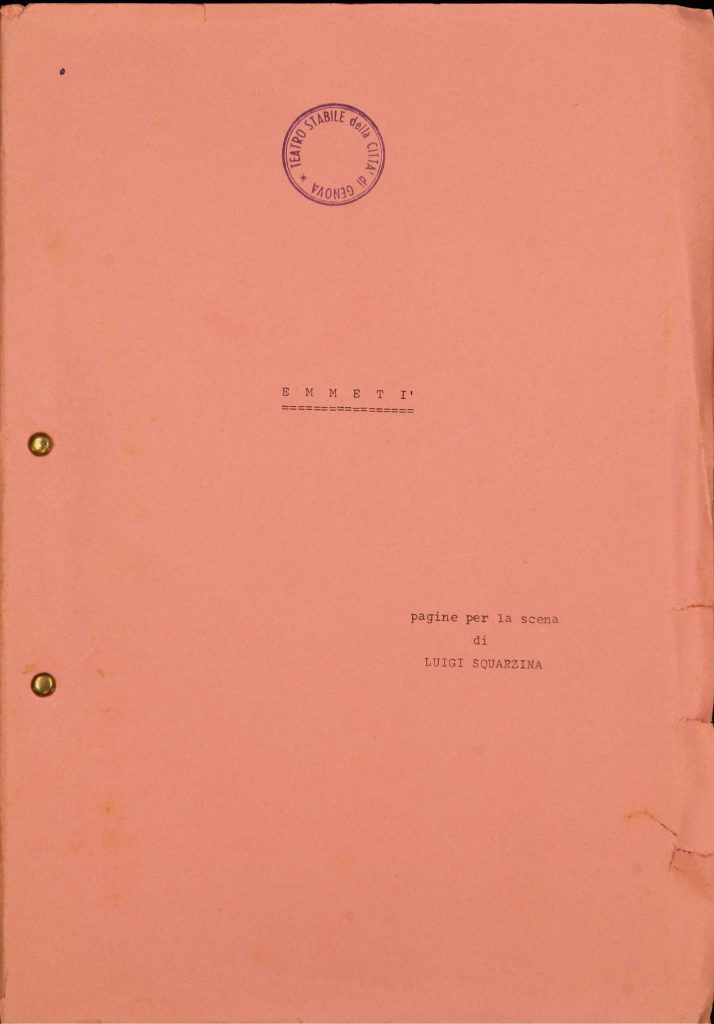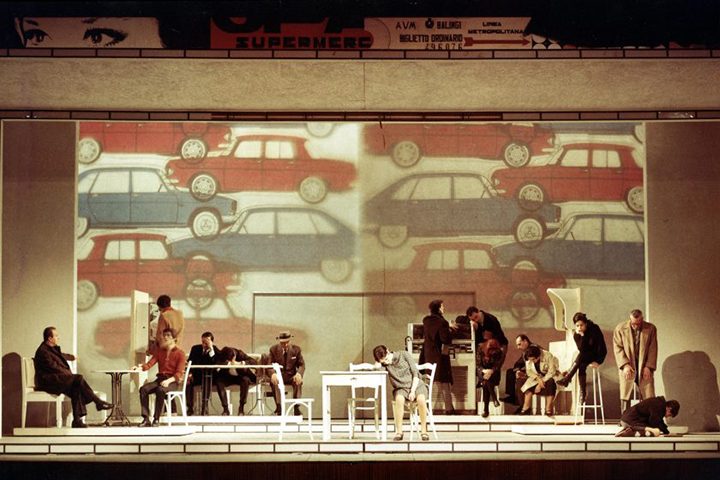Debutto: Genova, Politeama Genovese, 9 marzo 1966
| Regia | Luigi Squarzina |
| Regista assistente | Carlo Quartucci |
| Scene e costumi | Gianni Polidori |
| Musiche | Gino Paoli |
| Produzione | Teatro Stabile di Genova |
Personaggi e interpreti
| Caio | Ivo Garrani |
| Claudio | Paolo Ferrari |
| Crepacuore | Leo De Berardinis |
| Il giovane spento | Rino Sudano |
| Tomasi | Luigi Carubbi |
| Aldo | Piergiorgio Menegazzo |
| I tre belloni | Marcello Aste |
| L’uomo del juke-box/uomo al caffè | Gianni Fortebraccio |
| Mariateresa | Lea Massari |
| Cinzia | Livia Giampalmo |
| Susanna | Maria Grazia Grassini |
| Ondina | Gabriella Era |
| La casalinga | Anna D’Offizi |
| Uomini, donne e bambini al caffè | Luigi Castejon Giselda Castrini Cosimo Cinieri Sabina De Guida Sandro Dal Buono Giorgio De Virgiliis Margherita Fumero Enio Gaggiotti Vittorio Penco Maggiorino Porta Myria Selva |
| Voci del juke-box | Gino Paoli Lea Massari |
Scritta da Squarzina tra il 1961 e il 1963 è la storia di Caio, intellettuale da salotto che chiede ad Emmetì di far innamorare Claudio, giovane industriale, per carpire informazioni sulla avidità della borghesia. I due si innamorano ma poi Claudio ritorna dalla primitiva fidanzata ed Emmetì si accorge del velleitarismo rivoluzionario di Caio. Lieto fine parodistico: Emmetì e Claudio annunciano le loro nozze. La commedia costituisce una novità rilevante nel percorso artistico di Squarzina perché l’autore opera una brusca virata formale e stilistica, rispetto alla sua precedente produzione drammaturgica. Propone, cioè, “un preciso aggiornamento dei moduli espressivi” tenendo conto delle sperimentazioni in corso nell’arte e nella letteratura e delle esigenze espressive della neo-avanguardia teatrale in relazione alle tematiche più significative degli anni Sessanta del Novecento, come il consumismo, la civiltà di massa, la pubblicità, l’industria culturale.
Sfidando la critica più tradizionale, mette in atto una rischiosa operazione artistico-culturale. Scrive un testo senza punteggiatura e senza didascalie, in quanto limitative dell’efficacia della parola, sperimentando un linguaggio inedito per la scena italiana per evidenziare la banalità e l’insensatezza del linguaggio usuale che portano alla “dissoluzione di significati della vita quotidiana di quegli anni, riflettendone l’alienazione”. La commedia è definita dall’autore una critica parodica all’avanguardia con i mezzi stessi dell’avanguardia; in realtà c’è dentro Pirandello e Ionesco e c’è l’indignazione dell’uomo di cultura nei confronti della mercificazione della cultura e dell’arroganza dell’intellettualità pseudo-rivoluzionaria.
La commedia riceve grandi lodi dalla critica e ottiene il Premio IDI 1966, ma subisce un incredibile processo giudiziario per vilipendio alla religione. Squarzina ne esce assolto con formula piena perché la sua opera non solo non offende la religione, ma è ricca di una grande moralità.
 “La storia d’amore va letta soprattutto come un tentativo non riuscito di liberazione sessuale della protagonista e va inserita nel contesto storico della mercificazione di qualsiasi valore, dell’alienazione consumistica, della vacuità parolaia, della rinuncia alla responsabilità. Sono queste gravi contraddizioni della società dell’epoca che mi interessava ben rappresentare e che del resto si ripercuotono sul rapporto d’amore tra Emmetì e Claudio determinandone il fallimento”.
“La storia d’amore va letta soprattutto come un tentativo non riuscito di liberazione sessuale della protagonista e va inserita nel contesto storico della mercificazione di qualsiasi valore, dell’alienazione consumistica, della vacuità parolaia, della rinuncia alla responsabilità. Sono queste gravi contraddizioni della società dell’epoca che mi interessava ben rappresentare e che del resto si ripercuotono sul rapporto d’amore tra Emmetì e Claudio determinandone il fallimento”.
Luigi Squarzina
Tratto da E. Testoni, Dialoghi con Luigi Squarzina, Firenze, Le Lettere, 2015, p. 176
Si ringrazia il teatro Nazionale di Genova per la concessione dell’utilizzo del materiale fotografico.

